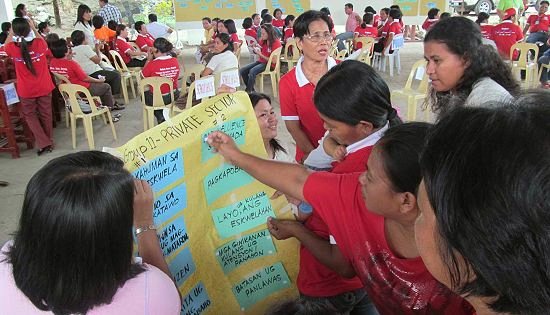|

Change
starts with awareness as participants of the education summit in
Liloan assessed the present status of their locality's
education, identifying the factors that affect the
teaching-learning process and governance in schools. (inset)
Students from Liloan schools are now engaged movers towards
achieving their schools' goals and their own dreams. |
“It takes a village
to educate a child”
By CHRISLEY ANN HINAYAS /
Ramon Aboitiz Foundation Inc.
September 19, 2012
CEBU CITY – With
the promise of good quality education, the dream of an eleven-year-old
girl of becoming a lawyer may be realized.
“We make our own dreams, but
it takes a village to make it come true,” Mary Shane Angtud, Supreme
Student Government president at Hubag Elementary School in Liloan,
Cebu said.
Angtud, together with other
students, shared their hearts’ desires during a recent education
summit in Liloan that gathered stakeholders, including parents, for
one purpose – to mobilize the community to help students like Angtud
achieve their dreams for a good quality education.
The summit featured best
practices in good school governance among teachers, school
administrators, purok leaders, government officials, private sector,
and students.
“School governance is the
active engagement of all values-driven stakeholders working together
for a shared vision to achieve excellence in education. The community
is the co-designer and co-owner of education. It is time to reclaim
this ownership and get involved,” Anthony Dignadice, executive
director of the Education Development Unit of the Ramon Aboitiz
Foundation Inc. (RAFI), said.
Dignadice added that as
proactive members in the community, the community can draw out the
flaws in the education system, thus, giving sustainable solutions to
address these challenges.
School governance, he
pointed out, establishes a relationship among stakeholders to be
responsible in setting a new direction for investing resources and
support in education. It develops a transition to effectively
delivering the inputs and outputs of quality education.
“Learning will only be
effective through community participation in systemic reforms of
quality education. People who are involved in school operation are the
best people to improve the quality of education,” Dignadice said.
Angtud said that the
scarcity of physical resources like books and classrooms are highly
important, but community engagement can do a lot more to address this.
“I believe that teachers and
the students are not enough to run the school. Without the support
from the community especially from our parents, students will not be
able to get full good quality education they deserve,” she said.
The story of an 18-year-old
teenager who left school with no definite reason inspired the purok
leaders in Lataban, Liloan to take continuous actions to be involved
in encouraging out of school youth to go back to school.
“We went to his house and
asked him for the reason behind leaving the school. It took us how
many tries to convince him to go back. In the end, he went back to
school,” Virgilio Monterola, purok president of Sitio Tambis, Lataban,
Liloan recalled in Cebuano.
Monterola added that
children need encouragement and guidance from the people around them.
“We saved the boy from
becoming a drop-out all his life. If we want the best for our
children, we also need to give them our best. The value of cooperation
among the teachers and the community can make a lot of difference in
the education system,” he explained.
Low participation of parents
during school assemblies was one of the concerns of the teachers and
administrators. The presence of the Parent Teachers Association (PTA)
members answered the concerns of the teachers regarding the matter.
“If parents are called to
have school meetings, they turn our invitations down. They have this
notion that PTA meetings are a time to collect contributions. School
assemblies should have been the venue for parents to air their
concerns on their children’s education. This is one of the challenges
of PTA, how to bring back the trust of the parents,” Victor
Libot-libot, PTA president of Integrated Calero Liloan School, said.
Parents, as first educators
of their children, are responsible for knowing what their children’s
problems and needs in school. Libot-libot said that as parents, they
need to address these problems firsthand.
“It is not about money. This
goes back to the attitude of our parents to coordinate with the
association. If parents cannot do it alone, then the whole association
is ready to help,” he added.
“We should encourage broader
community participation. The mantra that says: ‘It takes a village to
educate a child’ should always be our guide,” Dignadice concluded.
The education summit is one
of the activities of the Educational QUality ImProvement through
Community Empowerment and Capacity Building (EQUIP-CEBU) program, an
initiative of RAFI under its Education Development Unit, in
partnership with the local government units and Department of
Education.
EQUIP-Cebu seeks to empower
teachers, parents, and communities to continuously improve their own
schools and encourage them to be actively involved in the education of
the children.